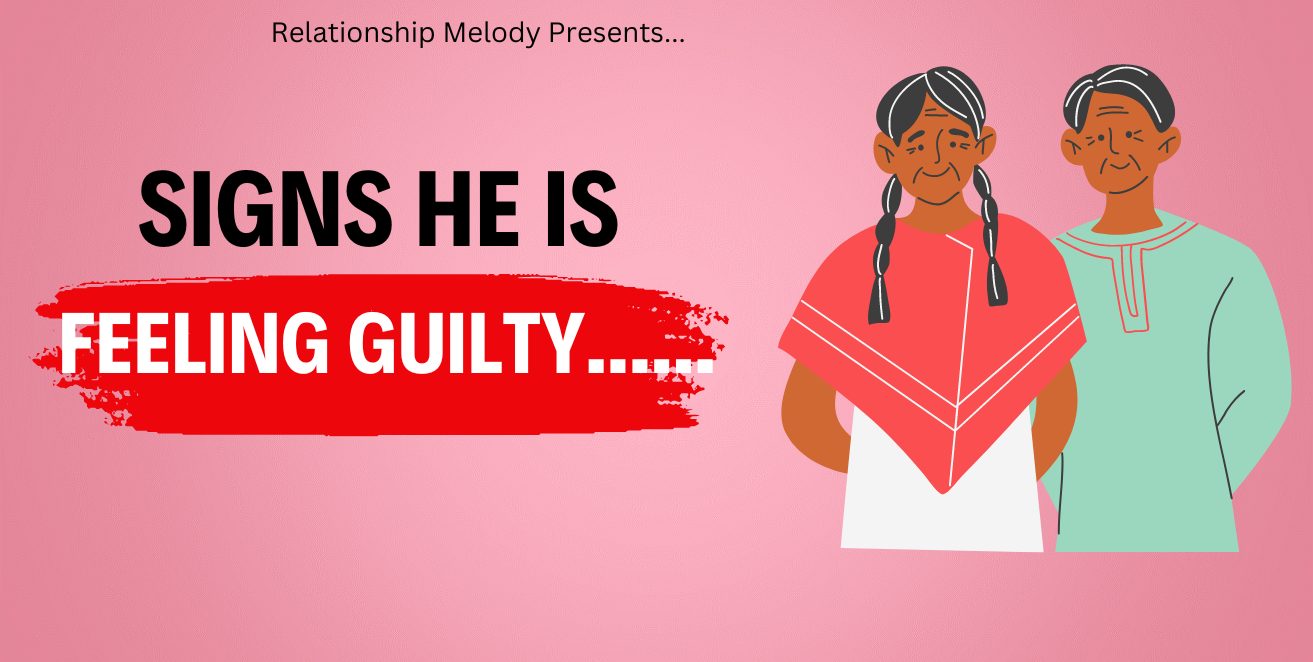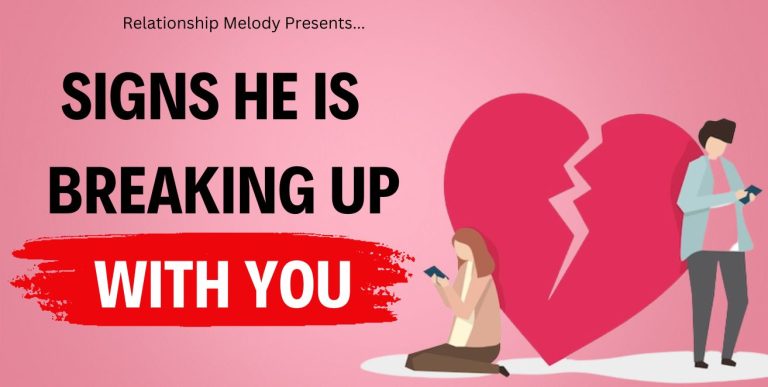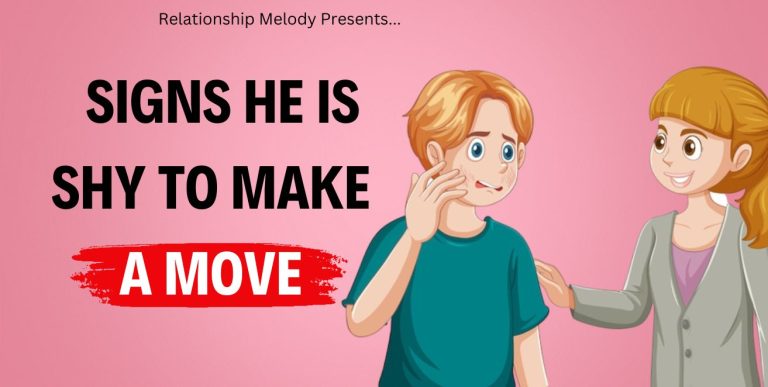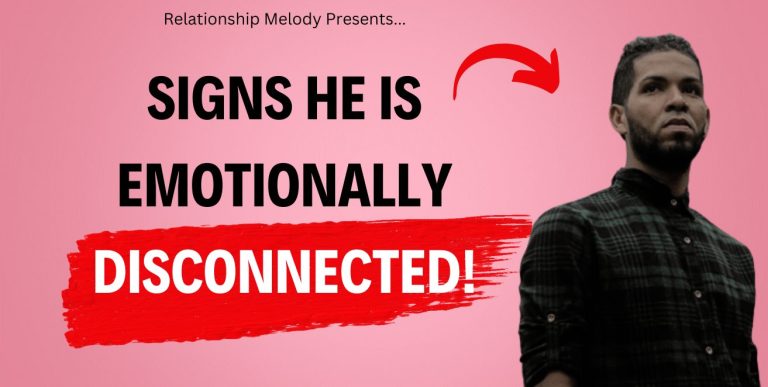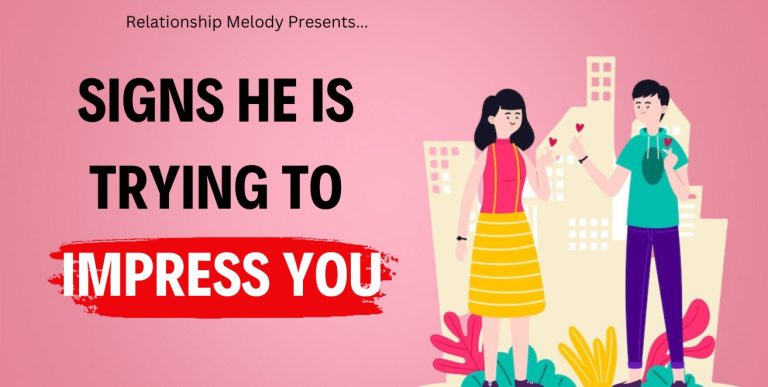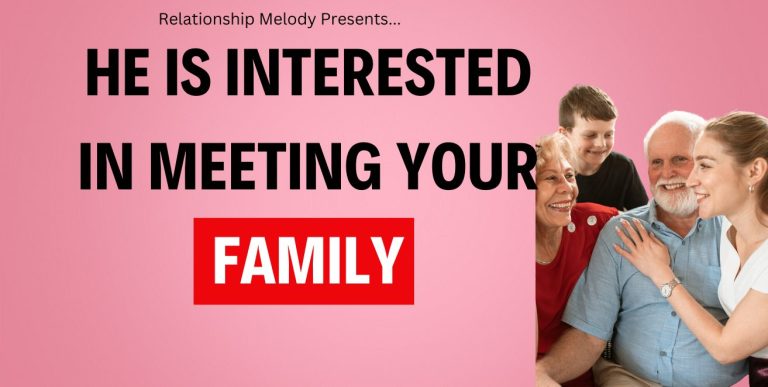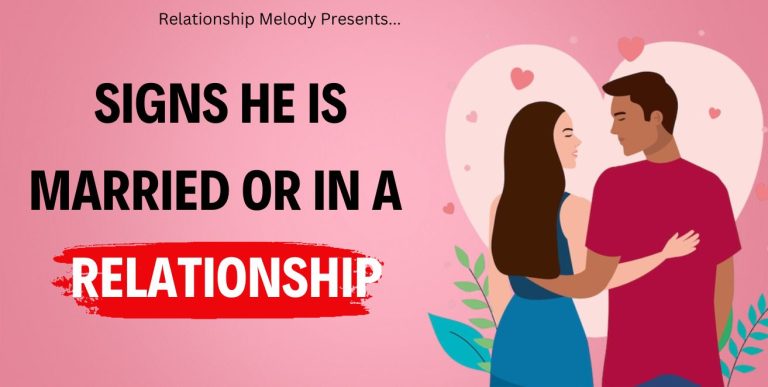25 Signs He Is Feeling Guilty
Relationships can sometimes be filled with complex emotions, and one such emotion that can significantly impact the dynamics is guilt. Whether it’s due to a mistake, a hidden secret, or a betrayal, guilt can weigh heavily on someone’s conscience.
If you suspect that your partner may be harbouring guilt, it’s crucial to pay attention to subtle cues that may reveal their inner turmoil. In this blog post, we’ll explore 25 signs that may indicate your partner is feeling guilty, helping you gain insight into their emotional state.
25 Signs He Is Feeling Guilty
Here are 25 signs to know!
#1 Frequent Apologies:
When someone is feeling guilty, they may find themselves apologizing excessively as a way to alleviate their guilt. Even for minor mishaps or situations that aren’t entirely their fault, they feel compelled to apologize repeatedly. This over apologizing behaviour stems from their need to seek forgiveness and ease their guilty conscience.
#2 Avoiding Eye Contact:
Difficulty maintaining eye contact during conversations is a common sign of guilt. When confronted or engaged in discussions that touch upon their actions, a guilty individual may struggle to make eye contact. They may feel shame or a fear of being caught, leading to a subconscious avoidance of direct eye contact as a way to hide their guilt.
#3 Increased Defensiveness:
A guilty person often becomes excessively defensive when questioned about their actions. They may feel the need to protect themselves from judgment or consequences. This defensiveness can manifest as arguing, deflecting blame, or even becoming confrontational. Their heightened defensiveness serves as a shield to avoid facing their guilt and potential repercussions.
#4 Unusual Gift-Giving:
Out-of-the-blue gestures, such as unexpected gifts or acts of kindness, may indicate guilt. The guilty individual may try to compensate for their wrongdoing by showering their partner with presents and affection. It’s their way of seeking forgiveness and demonstrating their remorse through material expressions.
#5 Withdrawal:
When someone is feeling guilty, they may withdraw emotionally from their partner or loved ones. They create distance in the relationship as a means to avoid facing their feelings of guilt. This withdrawal can manifest as reduced communication, decreased intimacy, or a general sense of emotional unavailability.
#6 Sudden Mood Swings:
Guilt can cause a person’s emotions to fluctuate dramatically. They may experience sudden shifts in mood, ranging from irritability to sadness or even anger. These mood swings occur as a result of their internal struggle with guilt, as they battle conflicting emotions and try to cope with the weight of their actions.
#7 Overcompensation:
To alleviate their guilt, a person may engage in overcompensation behaviours. They go above and beyond to please their partner or accommodate their needs. This excessive effort is an attempt to make up for their wrongdoing and restore balance in the relationship. They hope that by overcompensating, their guilt will be appeased and their partner’s forgiveness will be gained.
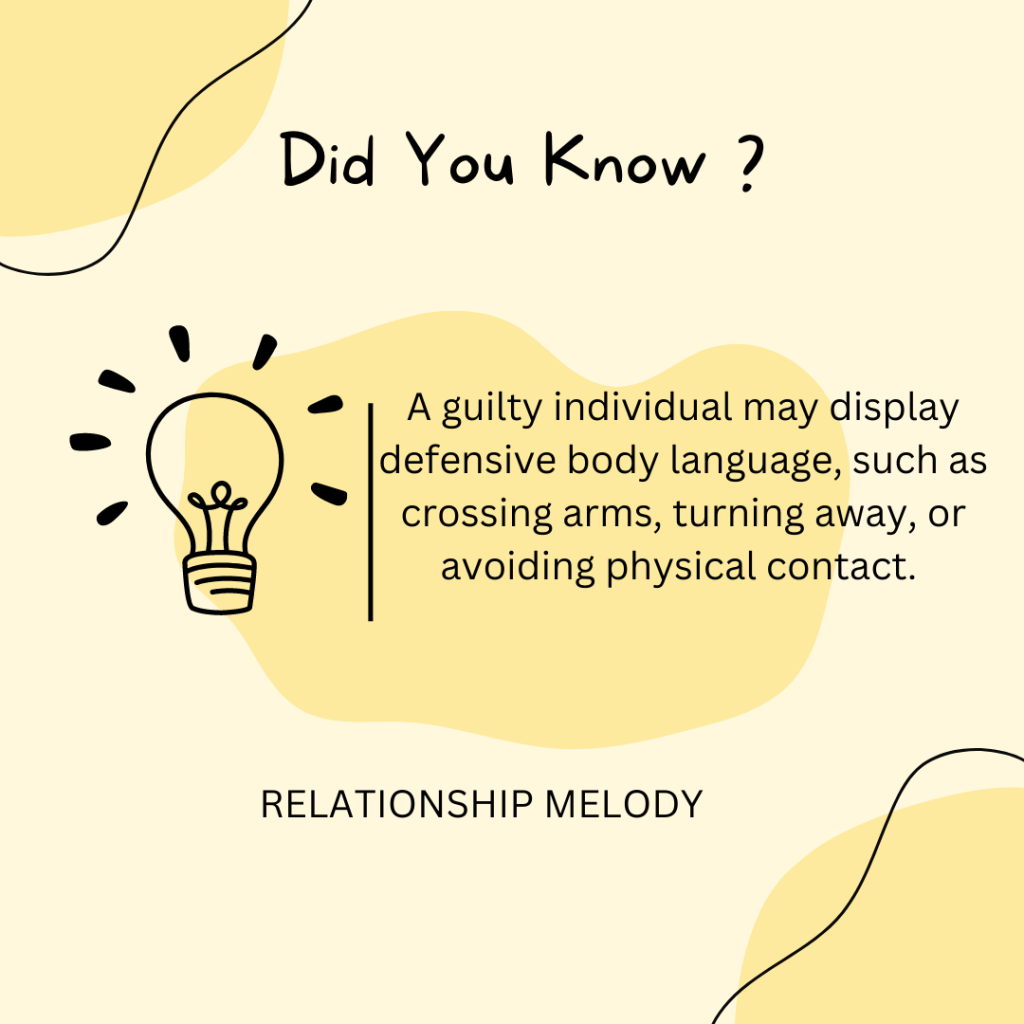
#8 Unexplained Absences:
Frequent and unexplained absences without plausible reasons can be a sign that your partner is engaging in activities they feel guilty about. These absences provide them with an opportunity to engage in behaviours or interactions that they want to keep hidden. It’s their way of avoiding confrontation or having to face the consequences of their actions.
#9 Unusual Deflecting:
A guilty partner may employ tactics of deflection when directly questioned about their actions. They might change the subject, divert the conversation, or avoid providing direct answers to avoid discussing their guilt. This deflection allows them to keep their secret hidden and evade the discomfort associated with facing their guilt head-on.
#10 Lack of Intimacy:
Guilt can create emotional barriers that hinder intimacy within a relationship. A guilty partner may withdraw physically and emotionally, leading to a decline in physical affection, sexual intimacy, and overall emotional closeness. They may feel unworthy of intimacy or fear that closeness will only amplify their guilt.
#11 Increased Secretiveness:
Guilt often prompts individuals to become more secretive in their behaviours. They may start password-protecting their devices, keeping conversations private, or exhibiting a heightened sense of privacy. These actions aim to hide their guilt-inducing activities or conversations from their partner, further deepening the sense of secrecy within the relationship.
#12 Excessive Jealousy:
A person burdened with guilt may exhibit heightened levels of jealousy. They might become overly possessive or suspicious, projecting their guilt onto their partner by assuming they are engaging in similar behaviour. This jealousy serves as a defence mechanism to divert attention from their actions and guilt.
#13 Change in Routine:
Guilt can disrupt a person’s regular routines and habits. If your partner suddenly changes their daily schedule without a clear reason, it could be an indicator of guilt. These changes may involve alterations in work hours, unexplained outings, or engaging in activities that deviate from their typical routine.
#14 Uncharacteristic Anger:
Feelings of guilt can manifest as uncharacteristic bursts of anger or frustration, often unrelated to the current situation. The guilt-ridden individual may project their internal turmoil onto others, displaying anger as a way to distract from their guilt or deflect attention away from their actions.
#15 Avoiding Specific Topics:
A guilty partner may consistently avoid discussing certain topics or events related to their actions. They may steer conversations away from the subject matter to prevent their guilt from being exposed. This avoidance serves as a protective measure to maintain the secret and avoid facing the consequences of their actions.
#16 Frequent Self-Blaming:
Individuals burdened with guilt often engage in excessive self-blame. They may take responsibility for circumstances beyond their control, attributing all negative outcomes to their actions or existence. This constant self-blaming serves as a form of self-punishment and a way to cope with their guilt.
#17 Changes in Sleeping Patterns:
Guilt can disrupt a person’s sleep patterns. They may experience insomnia, struggle to fall asleep or stay asleep due to racing thoughts and a guilty conscience. On the other hand, guilt can also lead to excessive sleeping as a means of escaping from their guilt-ridden reality.
#18 Lack of Eye Contact:
A guilty individual may consciously or subconsciously avoid eye contact, particularly during intimate moments. They may feel shame or remorse associated with their actions, making it difficult to maintain eye contact with their partner during vulnerable or intimate situations.
#19 Increased Sensitivity:
Guilt can heighten a person’s sensitivity to criticism or negative comments. They may interpret even constructive feedback as personal attacks, becoming defensive or emotionally reactive. This heightened sensitivity serves as a defence mechanism to protect their fragile emotional state and ward off feelings of guilt.
#20 Unusual Level of Secrecy:
Guilt often leads to an escalation in secretive behaviour. The guilty individual may exhibit an unusual level of secrecy by locking doors, hiding personal belongings, or being overly cautious about their actions. These behaviours aim to prevent their guilt from being discovered and to maintain a facade of normalcy.
#21 Excessive Remorse:
A person consumed by guilt may express excessive remorse for their actions. They may dwell on past mistakes, constantly seeking forgiveness and reassurance from their partner. This remorse can become overwhelming and all-encompassing, as they struggle to come to terms with their guilt.
#22 Defensive Body Language:
A guilty individual may display defensive body language, such as crossing arms, turning away, or avoiding physical contact. These defensive postures act as a protective shield, creating a barrier between themselves and their partner, further indicating their struggle with guilt.
#23 Unexplained Financial Changes:
Significant and unexplained shifts in financial behaviour can be a sign of guilt. This could include sudden large expenses, unaccounted-for debts, or unusual financial secrecy. These changes may indicate that the person is engaging in activities they feel guilty about, and they are trying to cover their tracks or hide their financial indiscretions.
#24 Inconsistent Stories:
A guilty individual may struggle to maintain consistency in their narratives. Their version of events may frequently change or contradict previous accounts. This inconsistency stems from the internal conflict between their guilt and the desire to maintain a façade of honesty.
#25 Increased Substance Abuse:
In some cases, individuals burdened by guilt may turn to substance abuse as a means of coping. They may seek solace or numb their emotions through drugs or alcohol, using them as a temporary escape from the overwhelming guilt they experience.
Read More: Signs he is feeling jealous
Conclusion:
Recognizing signs of guilt in a partner is essential for maintaining a healthy and honest relationship. While these 25 signs can provide insight, it’s important to approach the situation with empathy and open communication. If you suspect your partner is feeling guilty, initiate an honest conversation to address the underlying issues.
Remember, understanding and working through guilt together can lead to growth, forgiveness, and stronger bonds in your relationship.
Liked Our Article? Feel Free To Support Us
Our Patreon link: https://www.patreon.com/RelationshipMelody

Welcome to Relationship Melody! Our website is dedicated to all things on relationships, dating, and love! We are passionate about helping you navigate the ups and downs of love, and our goal is to provide you with valuable insights and information that will make your journey toward a fulfilling relationship smoother and more enjoyable.

